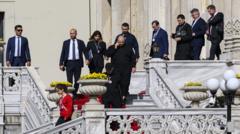Talks concluded in Turkey with both parties deeply divided over terms to end the ongoing conflict, primarily focusing on the exchange of prisoners rather than establishing a lasting cessation of hostilities.
**Russia and Ukraine’s Latest Peace Talks Yield No Ceasefire Progress Amidst Prisoner Exchange Agreement**

**Russia and Ukraine’s Latest Peace Talks Yield No Ceasefire Progress Amidst Prisoner Exchange Agreement**
In a recent round of negotiations in Istanbul, Russia and Ukraine fail to establish a ceasefire while agreeing on a prisoner exchange.
In a continuation of efforts to resolve the ongoing conflict, Russia and Ukraine’s second round of peace talks in Istanbul has once again come to an end without achieving a comprehensive ceasefire agreement. The Ukrainian negotiation team expressed disappointment as Russia rejected their call for an "unconditional ceasefire" while an agreement to exchange sick and heavily wounded prisoners of war emerged. Both sides also committed to returning the bodies of deceased soldiers, with Ukraine reporting it would return the bodies of 6,000 Russian soldiers.
The negotiations were held on a tense backdrop, with Russia currently holding approximately 20% of Ukraine’s territory, including the annexed Crimea peninsula since 2014. Ukrainian Defense Minister Rustem Umerov reiterated the demand for a 30-day ceasefire, incorporating land, sea, and air operations. He criticized Russia for not presenting any proposals prior to the talks while revealing that Ukraine had submitted its ceasefire terms days earlier.
Ukrainian President Volodymyr Zelensky responded sharply to Russia's stance, expressing skepticism regarding their offer of a temporary ceasefire, instead emphasizing the urgency of halting casualties. Meanwhile, the Russian delegation, led by Vladimir Medinsky, maintained its demands for a full Ukrainian military withdrawal from disputed territories and international recognition of these regions, in addition to imposing limits on Ukraine’s military partnerships and forces.
Despite the serious nature of the meeting, expectations for success were low. After the talks, Medinsky confirmed that an exchange of all sick and wounded prisoners, along with individuals under 25 years of age, would occur; however, no specific timeline was provided. Russian media subsequently emphasized Moscow's demands once more, each of which have been characterized as unreasonable by Western nations and Ukraine.
As pressures escalated, especially from Ukraine's allies urging for more stringent sanctions on Russia, President Zelensky highlighted the necessity for bolstered defense support, insisting that the absence of substantive progress signals a need for strategic fortification. Amidst these complex negotiations, U.S. political developments added further layers, with President Donald Trump advocating for a possible truce meeting involving both leaders, yet also emphasizing the need for careful scrutiny of Russia’s actions.
As the war continues, both sides remain entrenched in their positions, leaving the future of peace talks uncertain as voices call for concerted efforts to reach a diplomatic resolution.
The negotiations were held on a tense backdrop, with Russia currently holding approximately 20% of Ukraine’s territory, including the annexed Crimea peninsula since 2014. Ukrainian Defense Minister Rustem Umerov reiterated the demand for a 30-day ceasefire, incorporating land, sea, and air operations. He criticized Russia for not presenting any proposals prior to the talks while revealing that Ukraine had submitted its ceasefire terms days earlier.
Ukrainian President Volodymyr Zelensky responded sharply to Russia's stance, expressing skepticism regarding their offer of a temporary ceasefire, instead emphasizing the urgency of halting casualties. Meanwhile, the Russian delegation, led by Vladimir Medinsky, maintained its demands for a full Ukrainian military withdrawal from disputed territories and international recognition of these regions, in addition to imposing limits on Ukraine’s military partnerships and forces.
Despite the serious nature of the meeting, expectations for success were low. After the talks, Medinsky confirmed that an exchange of all sick and wounded prisoners, along with individuals under 25 years of age, would occur; however, no specific timeline was provided. Russian media subsequently emphasized Moscow's demands once more, each of which have been characterized as unreasonable by Western nations and Ukraine.
As pressures escalated, especially from Ukraine's allies urging for more stringent sanctions on Russia, President Zelensky highlighted the necessity for bolstered defense support, insisting that the absence of substantive progress signals a need for strategic fortification. Amidst these complex negotiations, U.S. political developments added further layers, with President Donald Trump advocating for a possible truce meeting involving both leaders, yet also emphasizing the need for careful scrutiny of Russia’s actions.
As the war continues, both sides remain entrenched in their positions, leaving the future of peace talks uncertain as voices call for concerted efforts to reach a diplomatic resolution.


















